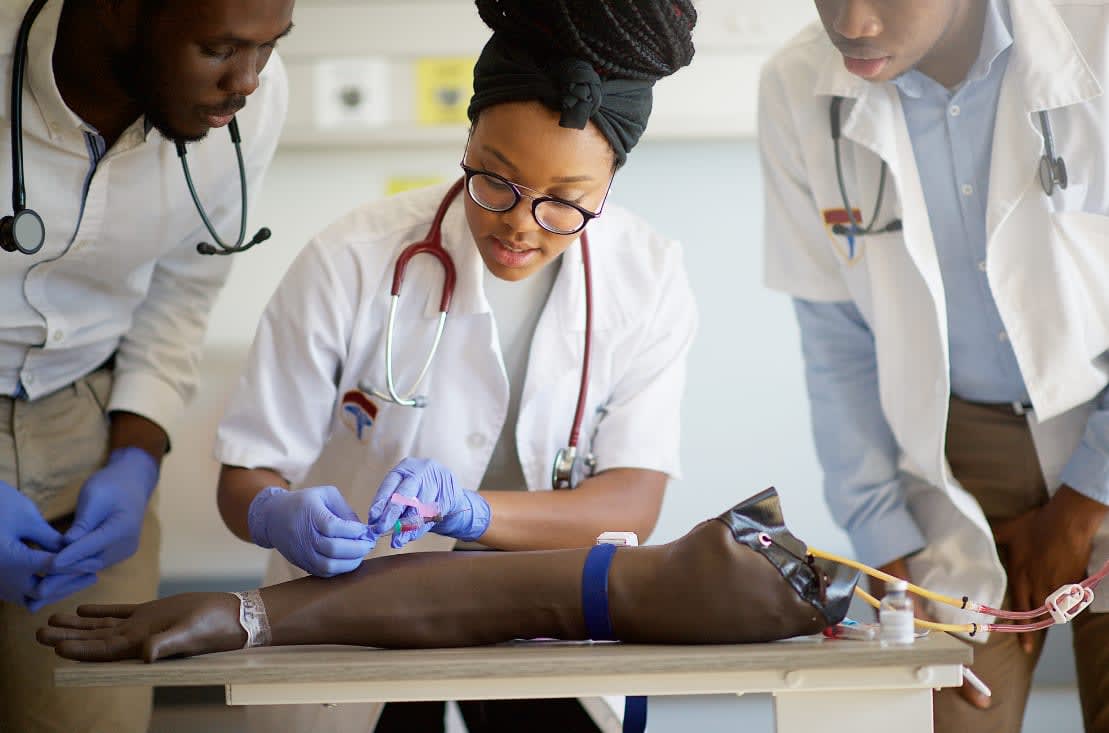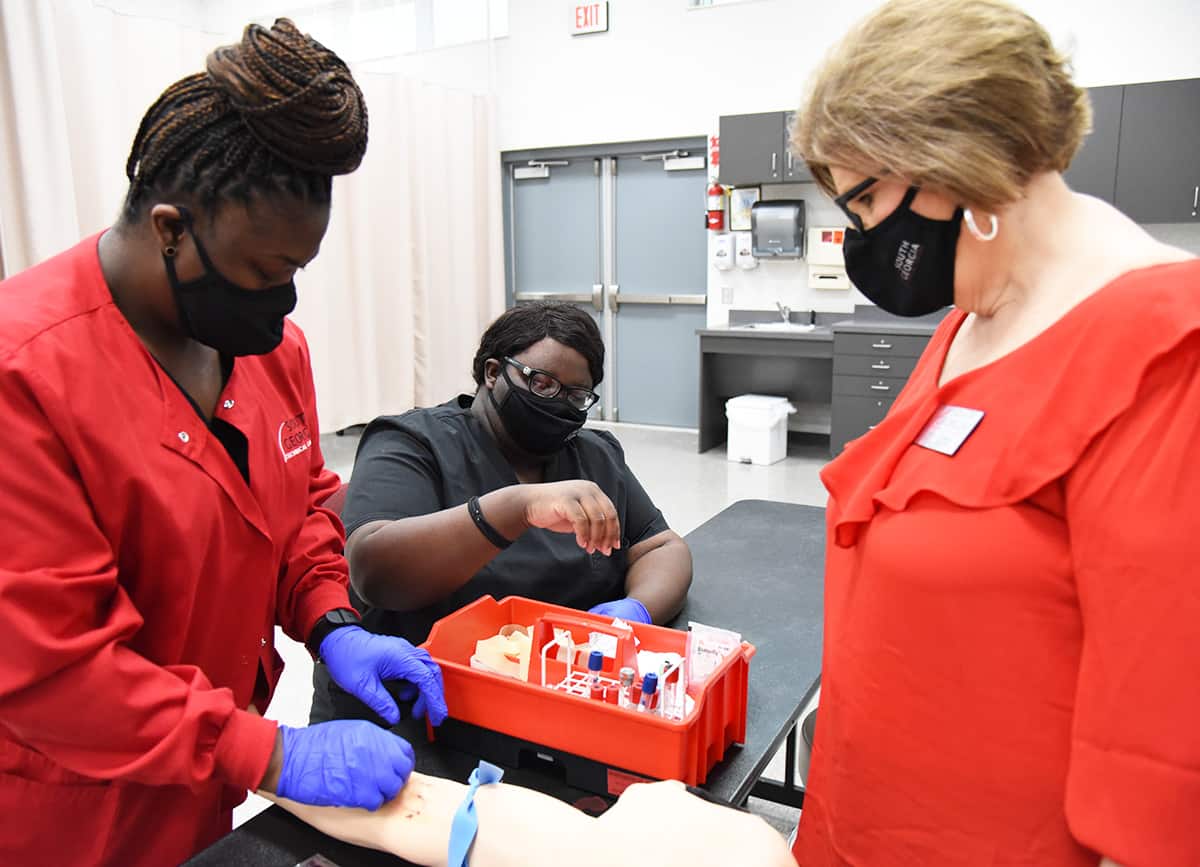Fast-Track or Full-Length? Everything About Completing a Phlebotomy Training Course
Wiki Article
The Path to Certification: Comprehending the Phlebotomy Educating Program Trip and Its Value
As you take into consideration the course to qualification in phlebotomy, it's important to recognize the duty you'll play in healthcare. Your training will certainly cover crucial skills, from blood collection techniques to patient communication. Each part of the program prepares you for the difficulties ahead. What precisely does the journey entail, and why is certification so critical for your future job? Let's check out these inquiries further.
The Function of Phlebotomists in Healthcare
Phlebotomists play an essential duty in the medical care system, acting as the important link between clients and necessary diagnostic testing. You'll perform blood attracts, making sure examples are accumulated accurately and securely. Your knowledge assists in detecting clinical conditions, keeping an eye on wellness, and assisting treatment decisions.In your everyday interactions, you'll need to develop trust with individuals, making them really feel comfortable during what might be a demanding experience. You are accountable for classifying and handling examples carefully to stop contamination or mistakes, which can affect examination results.
Beyond this, you'll commonly function together with doctors and nurses, communicating crucial info regarding clients' conditions. By grasping your skills, you contribute meaningfully to patient care, making you an indispensable part of the clinical team.
Overview of Phlebotomy Training Programs
When exploring phlebotomy training programs, you'll find various types created to fit different schedules and learning designs. Each program aids you create crucial abilities like blood collection and individual interaction. Understanding these options is vital to picking the ideal path for your career.Kinds Of Training Programs
Several kinds of training programs are available for those looking to become skillful in phlebotomy. In addition, some healthcare facilities and clinics supply on-the-job training programs, offering sensible experience while you learn. Whatever path you pick, each program aims to equip you with the necessary skills for an effective phlebotomy job.
Trick Skills Developed
Understanding phlebotomy needs a set of vital skills that are developed with comprehensive training programs. In addition, communication skills are essential; you'll need to connect with clients, explain treatments, and put them at simplicity. Each of these skills is necessary for your success as a certified phlebotomist, making you a beneficial possession in any kind of health care setup.Secret Elements of a Phlebotomy Program
In a phlebotomy training course, you'll concentrate on crucial topics that lay the foundation for your future career. You'll involve in hands-on training that permits you to apply what you have actually found out in real-world settings. Both the curriculum and practical experience are crucial for your success as a phlebotomist.Curriculum Summary
While going after a phlebotomy training program, you'll experience a core educational program designed to furnish you with basic abilities and knowledge. Phlebotomy Classes Near Me. This curriculum normally includes anatomy and physiology, concentrating on the blood circulation system and recognizing blood components. You'll likewise discover different kinds of blood collection techniques, consisting of venipuncture and capillary slit techniquesFurthermore, infection control and safety and security protocols are important components, ensuring you understand exactly how to maintain a clean and sterile setting. You'll research patient interaction, highlighting communication and compassion, which are vital for easing patient anxiety. Finally, moral and legal factors to consider will certainly be resolved, preparing you for real-world obligations. This fundamental knowledge will certainly enable you to excel as a phlebotomist and offer high quality care in clinical settings.
Hands-On Training Experience
Getting hands-on experience is an essential part of your phlebotomy training program. This useful training allows you to use what you've learned in a real-world setup, improving your skills and self-confidence. You'll practice venipuncture strategies, discover just how to manage different kinds of specimens, and obtain acquainted with the equipment made use of in look at this web-site the field. Under the guidance of knowledgeable instructors, you'll improve your skills, guaranteeing you're gotten ready for any scenario you might encounter.Furthermore, you'll get the possibility to connect with clients, which is crucial for establishing your interaction skills. This combination of technological proficiency and interpersonal abilities is critical for your success as a licensed phlebotomist. Inevitably, hands-on training is where theory satisfies technique, solidifying your understanding and preparedness for certification.
Accreditation and Licensing Demands
Before you can start your occupation in phlebotomy, it is essential to understand the accreditation and licensing demands that differ by state. Many states need phlebotomists to hold a qualification from an identified organization, such as the National Phlebotomy Association or the American Society for Scientific Pathology. These qualifications generally include passing an examination that examines your expertise and skills in the field.In addition to accreditation, some states have certain licensing needs. You might require to finish a particular variety of hours in professional technique, send evidence of training, look at more info or undertake a history check. It is essential to research your state's policies to make certain you satisfy all required requirements.
Staying informed about these requirements not only helps you safeguard a placement yet additionally improves your integrity as an expert. By fulfilling these demands, you'll be well on your way to an effective profession in phlebotomy.
Hands-On Training and Practical Experience
Hands-on training and functional experience are important parts of your phlebotomy education, as they enable you to use academic expertise in real-world scenarios. Throughout your training, you'll participate in monitored venipuncture, discover appropriate techniques, and become familiar with different blood collection equipment. This direct participation is vital for constructing your self-confidence and sharpening your skills.You'll work carefully with seasoned specialists who can direct you with the nuances of patient communication and example handling. Each session not only strengthens your understanding yet additionally prepares you for the fast-paced environment of health care setups.
Furthermore, many programs incorporate clinical turnings, enabling you to experience varied setups, from health centers to outpatient facilities. This exposure aids you adapt to various obstacles and individual needs, guaranteeing you're well-prepared for your future duty. Welcome these opportunities, as they're vital to becoming a proficient and caring phlebotomist.
Challenges Encountered During Training
While obtaining hands-on experience is necessary, it's essential to acknowledge the challenges that can emerge during your phlebotomy training. Additionally, mastering the skills needed for blood attracts takes technique; you might struggle with strategy initially.Time monitoring can likewise be a hurdle, as harmonizing theory, useful sessions, and personal commitments can really feel daunting. You may encounter varying discovering paces amongst your peers, resulting in sensations of insecurity if you assume you're falling back. Finally, adjusting to the different personalities of teachers can be difficult, as each may have a special mentor design.
Identifying these challenges beforehand can prepare you for success and aid you develop resilience throughout your training trip.
Profession Opportunities After Qualification

As you get experience, you may even take into consideration specializing in areas like pediatric or geriatric phlebotomy, dealing with specific individual requirements. Some phlebotomists choose to advance their jobs by coming to be lab service technicians or going after additional education and learning in healthcare fields.
Furthermore, your certification can bring about functions in training or supervising brand-new phlebotomists, enabling you to share your expertise. With the medical care market continuously growing, your abilities will constantly be in demand, paving the method for a stable and fulfilling job. Embrace the possibilities waiting on you!
Frequently Asked Concerns
What Is the Common Period of a Phlebotomy Training Program?
Phlebotomy training programs typically last around four to 8 weeks. You'll participate in hands-on technique, class direction, and on the internet learning. Finishing this training prepares you for accreditation and a satisfying job in medical care.Are Online Phlebotomy Courses Available?
Yes, on the internet phlebotomy programs are offered. They use versatility and ease, permitting you to research at your own rate. Just verify the program is accredited to fulfill qualification requirements and acquire useful abilities for your profession.Just How Much Does Phlebotomy Training Commonly Expense?
Phlebotomy training generally sets you back in between $700 and $2,500, depending on the program and place. You ought to take into consideration elements like program size, consisted of materials, and hands-on experience when selecting the ideal training for you.What Prevail Prerequisites for Phlebotomy Training?
Typical requirements for phlebotomy training typically consist of a secondary school diploma or GED, immunizations, and a background check. Some programs may additionally call for standard health care understanding or qualifications, guaranteeing you're gotten ready for hands-on training.Can I Work While Completing My Phlebotomy Training?
Yes, you can work while completing your phlebotomy training. Many trainees balance tasks with their research studies, but make certain to handle your time effectively to ensure you fulfill both job and training commitments successfully.Report this wiki page